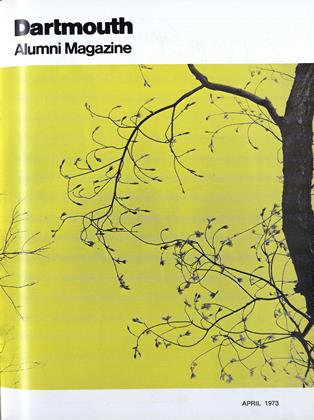THE PAPERS OF ADLAI E. STEVENSON: WASHINGTON TO SPRINGFIELD. 1941- 1948.
APRIL 1973 CHARLES M. WILTSETHE PAPERS OF ADLAI E. STEVENSON: WASHINGTON TO SPRINGFIELD. 1941- 1948. CHARLES M. WILTSE APRIL 1973
Vol. 2. Walter Johnson'37, Editor. CarolEvans, Assistant Editor. Boston: Little, Brown,and Company, 1973. 620 pp. $15.
This second volume of Stevenson papers brings into clear focus the many facets of an extraordinary career. The book begins with Stevenson's appointment in mid-1941 as special assistant to Navy Secretary Frank Knox. It ends with his election as Governor of Illinois by the largest plurality in the state's history. Between these two events lie years of crisis, of supreme effort, of testing and reevaluation for all America. These were the years in which a reputedly peaceable people created, exploited, and dismantled the greatest militaryindustrial machine the world had ever known. They were years that saw also the discovery of overwhelming forms of power destined to compel a new industrial revolution, and concomitantly the emergence of a second and better articulated attempt at world organization, bringing with it a national sense of responsibility for the welfare of less highly developed peoples.
The same years saw Adlai Stevenson shake off the daily routine of a Chicago law practice concerned largely with the making and retention of wealth to become one of the most perceptive, best informed, persuasive, and withal compelling political figures of our time. This volume is the unobtrusive and often unintentional record, in letters, speeches, diary entries, reports and memoranda of the impact of those years on a keenly receptive mind, and of the unheralded contributions made behind the scenes by one who operated throughout the period at the sub-cabinet level, where so much of the significant work of government is done. After Knox's death in the summer of 1944 Stevenson returned briefly to his Chicago law practice, but his heart was not in it. Early in 1945 he was back in Washington, this time in the Department of State where he was a key figure in drafting the United Nations charter, and in securing its acceptance by Congress and by the American people. For these services his reward was to be named first as alternate, then as delegate to the U.N. General Assembly.
As he became more widely and favorably known, it was inevitable that Stevenson would be urged to run for public office. All such blandishments were brushed aside until 1948. He would then have preferred the Senate, but the Illinois Democratic organization regarded Paul H. Douglas as the stronger candidate. Stevenson's nomination for governor was a consolation prize. He would gain experience and not be disgraced if he lost. His triumph was so overwhelming that he carried the national ticket with him.
Dartmouth Professor of History, Emeritus, Mr.Wiltse, assisted by a staff of experts, is Editor-in-Chiefof the Papers of Daniel Webster, a majorpublishing project at Dartmouth College.
 View Full Issue
View Full Issue
More From This Issue
-
 Feature
FeatureMedical Care via Television
April 1973 By BLISS KIRBY THORNE '38 -
 Feature
FeatureGuatemalan Cane Raiser
April 1973 By M.B.R. -
 Feature
FeatureArt Carpenter
April 1973 -
 Feature
FeatureHanover Has A Mardi Gras
April 1973 -
 Article
ArticleFaculty
April 1973 By ROBERT B. GRAHAM '40 -
 Article
ArticleThe Undergraduate Chair
April 1973 By DREW NEWMAN '74
CHARLES M. WILTSE
-
 Books
BooksJOSHUA R. GIDDINGS AND THE TACTICS OF RADICAL POLITICS.
OCTOBER 1970 By Charles M. Wiltse -
 Books
BooksTHE PAPERS OF ADLAI STEVENSON.
January 1974 By CHARLES M. WILTSE -
 Article
ArticleWebster and a Small College
April 1974 By CHARLES M. WILTSE -
 Books
BooksTHE PAPERS OF ADLAI E. STEVENSON. VOL. 4. LETS TALK SENSE TO THE AMERICAN PEOPLE." 1952-1955
July 1974 By CHARLES M. WILTSE -
 Books
BooksTalking Sense
JAN./FEB. 1978 By CHARLES M. WILTSE -
 Books
BooksRecord Completed
March 1980 By Charles M. Wiltse
Books
-
 Books
BooksFaculty Publications
AUGUST 1929 -
 Books
BooksHerbert L. Searles '17
June 1947 -
 Books
BooksAlumni Articles
December 1956 -
 Books
BooksWINKING WILLIE
December 1948 By LORNA GAHAGAN, Distaff '35. -
 Books
BooksTHE ESSAY: A CRITICAL ANTHOLOGY
July 1952 By Robert S. Kinsman '40 -
 Books
BooksPOLITICS AND PUBLIC SERVICE:
June 1939 By W. L. Eager '23

